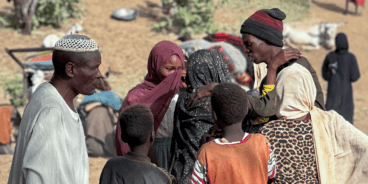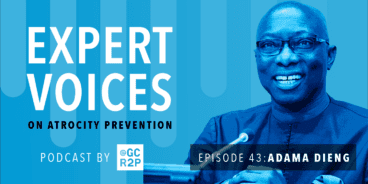
Atrocity Alert No. 84: South Sudan, Democratic Republic of the Congo and Somalia
Atrocity Alert is a weekly publication by the Global Centre for the Responsibility to Protect highlighting situations where populations are at risk of, or are enduring, mass atrocity crimes.
Another Grim Anniversary in South Sudan
This Friday, 15 December, will mark the fourth anniversary of the start of the civil war in South Sudan. Since December 2013 the Sudan People’s Liberation Army (SPLA) and various armed groups, including the SPLA in Opposition (SPLA-IO), have perpetrated atrocities against civilians, including indiscriminate and targeted killings, and widespread sexual violence.
Armed conflict has resulted in a catastrophic humanitarian crisis. Since 2013 an estimated 4 million South Sudanese have been forced to flee their homes. The SPLA, SPLA-IO and other armed groups have deliberately impeded humanitarian operations and systematically obstructed UN peacekeepers from upholding their protective mandate. According to the UN Office for the Coordination of Humanitarian Affairs, 4.8 million people in South Sudan are now severely food insecure and 1.1 million children are acutely malnourished.
During August 2015 the parties to the civil war signed the “Agreement on Resolution of Conflict in the Republic of South Sudan,” but failed to take genuine steps towards permanently ending armed hostilities. More than two years later the Intergovernmental Authority on Development is once again attempting to resuscitate the Peace Agreement through the establishment of a High-Level Revitalization Forum. However, bitter personal rivalries among South Sudan’s senior political leaders, as well as competing regional interests, still present significant obstacles to a lasting peace.
In addition to ongoing armed conflict, the government has failed to prevent deadly inter-communal violence. Since 6 December more than 170 people have been killed in fighting between rival Dinka clans, the Rup and Pakam, in Jonglei State. The clashes started a week after a 28 November attack by ethnic Murle fighters on a Dinka village that resulted in 45 deaths.
Despite four years and the deaths of more than 50,000 people, no sustainable progress has been made regarding the “peace process” in South Sudan. Warlordism, corruption and recurring cycles of armed conflict and mass atrocities have made South Sudan one of the poorest and most deadly places on earth for civilians. If the High-Level Revitalization Forum is to succeed, it must ensure that all of South Sudan’s leaders are finally held accountable for the full and immediate implementation of all the key provisions of the 2015 Peace Agreement. This must include the Hybrid Court to investigate and punish those responsible for potential war crimes and crimes against humanity.
War Crimes Against UN Peacekeepers
Fourteen UN peacekeepers from Tanzania were killed and more than fifty peacekeepers were wounded in the Beni region of the Democratic Republic of the Congo (DRC) on 7 December when the Semuliki base of the UN Stabilization Mission in the DRC (MONUSCO) was attacked by armed men. While no one has claimed responsibility for the attack, MONUSCO suspects the perpetrators were from the Allied Democratic Forces (ADF), an armed group that has killed hundreds of civilians in Beni since 2014. Five soldiers from the DRC were also killed in the Semuliki attack.
Attacks on UN peacekeepers constitute a war crime under international law. This attack – the largest in recent history – brings the total number of UN peacekeepers who died in the field this year to more than 115. The missions with the highest number of fatalities during 2017 include MONUSCO with 24 deaths, and the missions in Central African Republic (MINUSCA) and Mali (MINUSMA), where 25 and 37 have died, respectively. These fatalities highlight the complexity and intensity of a growing number of conflict situations around the world where UN peacekeepers are deployed to protect civilians.
Every day UN peacekeepers uphold the international community’s responsibility to protect people from genocide, war crimes, crimes against humanity and ethnic cleansing. The UN Security Council must ensure that budget cuts and political decisions over troop reductions do not endanger the lives of those who provide essential security to the world’s most vulnerable populations.
Child Soldiers and Civilian Deaths in Somalia
On Sunday, 10 December, the UN Assistance Mission in Somalia and the UN Office of the High Commissioner for Human Rights released a report detailing violations of International Humanitarian Law and International Human Rights Law committed in Somalia from January 2016 until October 2017. According to the report, at least 2,078 civilians were killed, including 1,233 fatalities attributed to the armed extremist group Al-Shabaab, and 329 caused by Somali security forces and troops from the African Union Mission in Somalia (AMISOM).
The report documented the particularly dire impact of Somalia’s ongoing armed conflict on children, noting that at least 1,847 children were killed or maimed and 535 were raped during the period covered in the report. In addition, Al-Shabaab was responsible for 71 percent of child soldiers recruited during 2017, and the total number of child soldiers recruited per year in Somalia has more than tripled since 2015.
Despite gradual political progress in Somalia, the use of child soldiers, routine violations of human rights and deadly attacks on civilians continue. The Somali Federal Government and AMISOM must ensure that their military operations against Al-Shabaab are carried out in strict adherence with international law and make every effort to protect civilians.
All alleged war crimes in Somalia – including the recruitment of child soldiers – must be properly investigated and the perpetrators held accountable. The UN Security Council and African Union should ensure that the Somali National Army, which the report noted also continued to use child soldiers, must immediately release and reintegrate them into society.


Expert Voices on Atrocity Prevention Episode 43: Adama Dieng
